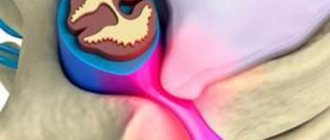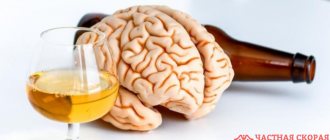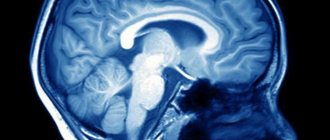Medical information is reliable Checked by Eremin Alexey Valentinovich
A mental disorder in which a person is haunted by obsessive thoughts and actions is called obsessive-compulsive disorder or obsessional neurosis. This phenomenon significantly reduces the quality of life and therefore treatment of obsessive-compulsive disorder in Moscow should begin as early as possible. For this, Dr. Isaev’s clinic has all the capabilities - experienced specialists, the best branded drugs, equipped comfortable wards and rooms for outpatient visits.
Obsessions and compulsions
Obsessions are obsessive thoughts, fantasies, fears, and images. The person understands the abnormality of his condition, but cannot switch to anything else. At this time, pressing problems and tasks fade into the background, and the process of normal life becomes impossible. Against the background of these phenomena, the patient experiences pronounced fear and anxiety. Most often, obsessions occur in the form of:
- aggressive impulses;
- erotic fantasies;
- memories of unpleasant episodes in life;
- phobias of irrational content.
The second part of the manifestation of the disease is compulsions, or obsessive ritual movements that are repeated many times. The patient feels the need to commit them, and when trying to resist, a feeling of strong tension and fear appears. A certain action gives him temporary relief, relieves the severity of anxiety, forcing repetition. The most commonly observed compulsions are:
- washing hands and body before wounds and irritation appear;
- constant house cleaning;
- putting things in the closet;
- constant checking of the iron, stove, door lock;
- counting objects (pillars, trees, steps);
- walking around or jumping over cracks in the asphalt;
- repetition of a certain set of words.
The main feature of obsessions is that they are devoid of rationalism. And compulsions are the inability to refuse them.
The patient himself is in an adequate state at this time and understands the strangeness of his sensations and behavior, and most often realizes the need for treatment of obsessive-compulsive disorder. And this fact further strengthens his position and multiplies the problem. He begins to be afraid of going crazy and worries about the safety of his loved ones. But, as practice shows, neurosis of this type does not lead to severe mental disorders, and even the most seditious and aggressive thoughts never turn into active actions. And this distinguishes a person with neurosis from a mentally abnormal patient in a state of passion or a patient with hallucinations.
The approximate number of people suffering from obsessional neurosis is 3% of the entire world population. But experts consider this figure to be underestimated, since many patients carefully hide their problem from others and do not want to go to the doctor. The manifestation of the disease is registered in the age category from 10 to 30 years in residents of cities with low incomes. Among the patients, there is a slight predominance of men over women. Usually, at least 5-7 years pass from the onset of the disease, after which a visit to a specialist for help follows.
If we describe the character of a patient with obsessive-compulsive disorder, it can be noted that he is different:
- high intelligence;
- adequate thinking;
- a heightened sense of responsibility;
- conscientiousness and anxiety;
- diligence and pedantry in performing work;
- suspiciousness and the desire to be the best in everything.
A person suffers from this disorder for a long time and goes to the doctor only when the pathology progresses, when the neurosis becomes noticeable to others and begins to significantly reduce the quality of life.
Fears and anxieties do not always accompany obsessive neurosis. They occur at different frequencies in all people. Phobias in a normal person usually act as a defensive reaction of the body. The well-known worry about an iron or gas stove not being turned off, followed by a check, cannot be considered a pathology. But if even after one or two or more tests a person continues to have a desire to repeat the test and constant fear even after it, then we can talk about the presence of a disorder.
How to help a loved one get rid of the disease?
- Show respect. To show respect, you need to support his idea that he is being persecuted, treat it with respect. This will help him relieve tension and feel supported and accepted.
- Come up with a solution. We need to come up with a story in which this persecution ends and he plays a role in ending it, or even emerges victorious. It should be very believable, not contradicting his reality. This is necessary so that a person can see ways out of this dangerous situation for him. So that he understands that this is not a dead end, that there is a script that can help him. And then his brain will reorient itself to getting out of this persecution. And he himself will help himself return to an adequate state.
But in order for this adequate state to be consolidated and a repetition of the attack of mania not to occur, this is not enough. Since mania arises as compensation for neediness and love, a person must feel this love in the external real world. Any mental disorder is a conflict between soul and body. Therefore, to eliminate this conflict, it is necessary to influence both of these components.
Embrace. The human body perceives love through tactile sensations. Therefore, a person definitely needs hugs. And the task of loved ones is to give these hugs. This should be done in such a way as not to cause rejection:
- sometimes by chance when hugging the shoulders,
- sometimes place your hand on the upper back in the area of the shoulder blades,
- and only after feeling acceptance, open your arms and hug completely.
Love. The Ho'oponopono technique will help you get rid of difficult worries about the fate of your loved one and help him accept love at the level of the soul and then the body. Its author is the American psychiatrist Hugh Len, who healed many of his patients thanks to this technique. It is very simple and very powerful. It contains only 4 phrases:
- I love you;
- I thank you;
- I forgive you (I'm sorry);
- I'm sorry.
These phrases should be addressed to your loved one. At first, you don’t have to say them out loud, but say them mentally. These phrases will help you fill your heart with gratitude and love and sincerely hug your loved one. These phrases will help his soul feel your love. He will feel it at the level of energy, emotions, your state. This will help him let go of worries, dissolve fears, and feel calm and safe.
Because the more you worry about him, the more acutely he feels anxiety in his space. And the calmer you are, the more calm and acceptance there is in the space around you, and the easier it is filled with gratitude and love. And he, sensing your condition, becomes calmer and feels needed. Information belongs to the site rew-med.info
Related posts:
- Panic disorder Having experienced this condition once, a person is so afraid of its repetition that...
- Symptoms and treatment of panic attacks A panic attack (PA) is an attack that develops in the shortest possible time,…
- What are paranoia and schizophrenia The difference between paranoia and schizophrenia lies in the symptoms. Both pathologies are dangerous...
- Pain in the neck, what is the cause and how to get rid of it. Perhaps almost everyone has experienced severe pain in the neck. Not necessary…
Causes of obsessive compulsive disorder
Before treating obsessive compulsive disorder, it is necessary to understand its etiology. The exact cause of the disease has not yet been established, but a number of factors have been identified that can provoke it. And their complex effects are often observed. It can be:
- psychotraumatic situations;
- constant stress;
- conflicts with loved ones and within the individual;
- severe fatigue, asthenia;
- belief in the power of rituals that save you from problems;
- excessive pedantry;
- low self-esteem;
- inability to adequately respond to life's difficulties;
- hereditary features of brain functioning;
- disruption of the autonomic nervous system;
- low levels of hormones (serotonin, norepinephrine, dopamine);
- disruption of the nervous system (muscle tension, stiffness);
- condition after an infection.
Recently, psychiatry experts have expressed an opinion about the great influence of characteristics of upbringing and other experiences in the formation of obsessive-compulsive disorder. It could be:
- tough and picky teaching style;
- the influence of a person important to the child with signs of obsessive-compulsive neurosis;
- rigor and moralism, religious education.
In order to identify the true cause of the disorder and receive full assistance, you should simply call Dr. Isaev’s clinic. You can do this for free, make an appointment with a doctor and get a full consultation.
Wrong internal beliefs also play a huge role in the manifestation of the disease, including:
- the belief that if you think about something often, it will definitely happen;
- prohibiting oneself from certain types of thoughts and fantasies;
- equating thoughts with actions according to the degree of responsibility;
- accepting blame for everything that happens around you and trying to change it.
Physical state
At the moment a person is immersed in one of the states described above, sweating is observed. My hands are getting cold, my temples are pounding. Symptoms are also observed in those who have a tendency towards manic attachment to something. So, when performing some action, for example, while playing a computer game, you begin to shake or your hands shake and cold sweat appears. Everything inside freezes, and the surrounding reality disappears - this is a symptom of an obvious psychological crisis. The help of a psychiatrist is needed.
Symptoms of obsessions and compulsions
Treatment of obsessive-compulsive disorder in Moscow at Dr. Isaev’s clinic is carried out successfully, since an individual approach is taken to each patient and only modern techniques are used. Therapy begins with identifying symptoms of deviation. The main signs of a violation are:
- presence of obsessions (obsessive thoughts);
- anxiety, tension and fear associated with them;
- compulsions (the same actions that allow you to get some relief).
All these manifestations form a single cycle, which repeats from time to time. Some patients have a predominance of obsessions, others have a predominance of compulsions, and there are also patients with the same severity of obsessive thoughts and actions.
Since the manifestations of the disease are not always typical, diagnosis requires consultation with an experienced psychiatrist and psychotherapist. To make an appointment, you can call or leave a request on the clinic’s website.
Mental symptoms
The disease is a mental disorder and is accompanied by characteristic symptoms. The patient's obsessive thoughts may include the following:
- fear of getting infected, getting dirty;
- unreasonable concern for the life and health of loved ones;
- fear of discovering that you are gay;
- sexual images and fantasies;
- constant desire for order and symmetry;
- excessive superstition, passion for ritual and cult phenomena.
With obsessive compulsive disorder, the thoughts and images that constantly come to him are perceived by the patient himself as his own. This disease differs from split personality, when the patient hears “voices” from the outside or from his “other self.” With neurosis, a person tries to control thoughts and movements, but he fails to do this. The more he resists, the more anxiety and desire to perform the ritual grows.
The most common compulsive movements associated with this disease are:
- plucking or pulling out body hair;
- constant washing of hands and body;
- nail biting;
- wiping door handles and other objects;
- checking the stove, iron, door lock;
- arranging things in strict order;
- accumulation of unnecessary trash;
- frequent utterance of prayers, mantras and other phrases.
Doing these actions itself does not bring much pleasure, but it can reduce the level of tension, fear and anxiety. But this only lasts for a while, and then obsessions arise again and the phobia grows, and the cycle repeats. Compulsions may outwardly look like normal work, this applies to putting things away or cleaning the house. In some cases, they have no rational basis, for example, jumping over asphalt cracks. But for the onset of calm, a person performs them without fail, but at the same time is fully aware of their uselessness and absurdity.
Physical signs
Treatment of obsessive-compulsive disorder in Moscow at Dr. Isaev’s clinic includes providing assistance to relieve mental symptoms and eliminate physical signs of pathology. Patients with obsessional neurosis often experience dysfunction of the autonomic nervous system. And this leads to the following deviations:
- insomnia;
- dizziness;
- heartache;
- headache;
- frequent blinking;
- seizures and tics;
- pressure surges (hypo- and hypertensive crises);
- loss of appetite;
- dyspepsia;
- increased sweating and chills;
- tachycardia;
- dyspnea;
- dry mouth;
- decreased libido, impotence.
All these disorders are complications of the underlying pathology. And with proper complex therapy they go away on their own. In some cases, additional treatment is required to speed up the restoration of autonomic functions.
The method of providing assistance also depends on the type of neurosis. It happens:
- chronic (from 2 months or more);
- recurrent (with periods of exacerbation and “bright” intervals);
- progressive (continuous manifestation with gradual deterioration).
When the disease becomes chronic, and the reason for this is often the lack of professional therapy, the type of obsessive states expands. If at the beginning of the disease a person could check that the stove or iron was turned off 2-3 times a day, then later this action begins to be repeated 5-6 times. With a progressive form of pathology, performing rituals can take the patient most of the day and there is no time left for other types of activity.
Fear
Most real patients with schizophrenia have encountered this phenomenon. Fear comes in tides. This phenomenon is also called panic attacks. It is uncontrollable and all-consuming. Covers and keeps for several hours. Often a person cannot even explain what exactly he is afraid of, because he is afraid of everything.
How do you know if you're going crazy? It's scary to be alone or go into the dark. There may be a fear of leaving the apartment or getting out from under the blanket. Any sound causes panic and horror. This is a sign that “the roof has leaked,” and there is a good reason to consult a psychiatrist.
Diagnostics
To make a diagnosis, doctors are usually guided by typical symptoms that act as criteria for obsessive-compulsive disorder:
- frequently repeated thoughts and actions;
- the patient’s assessment of thoughts and images as their own;
- attempts at unsuccessful resistance;
- negative attitude towards these phenomena in the patient;
- the appearance of signs of distress against the background of obsessions and compulsions.
In order to refine the diagnosis, special tests are used, during the assessment of which a psychiatrist or psychotherapist determines for himself the following basic aspects of pathology:
- the nature of thoughts and actions;
- frequency of their occurrence;
- the extent to which they interfere with the patient's daily life;
- the amount of time they take;
- the strength of a person’s desire to suppress the manifestations of the disease.
This test allows you to determine the presence and severity of obsessional neurosis. It is also used during treatment of the problem, repeating once a week to evaluate the effectiveness of the prescribed therapy.
It is mandatory to differentiate with other mental illnesses, which may be accompanied by similar symptoms, but require a slightly different approach to providing assistance. Obsessions occur in some types of depression and early schizophrenia.
When delirious, a person does not have a tendency to resist his thoughts and wishes, he shows solidarity with them, and in this case, treatment for schizophrenia is required. Obsessive neurosis is accompanied by the patient’s rejection of his obsessive obsessions and the presence of a critical attitude towards this problem.
In some cases, obsessive-compulsive disorder has concomitant neurotic abnormalities. Therefore, along with obsessive states, it may be necessary to treat depression, relieve excessive anxiety, and get rid of attention deficit disorder.
For other groups of people behaving inappropriately
there is the following rule. If a person behaves in such a way that one may suspect that he has a mental disorder, he can be provided with psychiatric help without his consent only when his actions pose an immediate danger to himself or others. This is written in Article 23 of the Law “On Psychiatric Care and Guarantees for Citizens in its Provision.” In other cases, assistance is provided only by court decision. An application to the court is submitted by a psychiatrist (local psychiatrist), who is conducting an appointment at a dispensary, or by a hospital emergency room doctor, if the patient was brought there.
Thus, the correct course of action in relation to a person suspected of suffering from a mental disorder is:
- Ensure your own safety
- Call the police if a person violates public order or someone else's rights
- Submit a written application to the psychiatric clinic at the patient’s place of residence
In conclusion, I would like to note that someone’s strange behavior never means a mandatory call to a psychiatrist or hospitalization in a psychiatric hospital. Perhaps the person has suffered mental trauma, serious stress or emotional shock; maybe he has lost his nerve, he is offended, angry, annoyed or humiliated. This condition is called an “acute affective reaction.” Over time, this condition can go away on its own: the person himself will find a way out of the situation. Inappropriate behavior may be due to the fact that he is under the influence of alcohol or drugs, and his inappropriate behavior is associated with this. And this will also pass without outside help, without examination or hospitalization.
And there is another very important thought that I would like to express. Please remember that in any case, you alone are responsible for your own safety. Try to ensure this safety for yourself first. Do not attempt to assist persons who are not helpless. Especially if you are not asked to do so. If you really want to help a mental patient, call a specialist. And then everything will be okay.
All materials on the site are presented for informational purposes only, approved by certified physician Mikhail Vasiliev, diploma series 064834, in accordance with license No. LO-77-005297 dated September 17, 2012, by a certified specialist in the field of psychiatry, certificate number 0177241425770.
Treatment of obsessive-compulsive disorder in Moscow
Treatment of obsessive-compulsive disorder in Moscow at Dr. Isaev’s clinic is carried out after a survey, examination and consultation of the patient with a number of specialists - a neurologist, psychiatrist, medical psychologist and psychotherapist. Each admitted patient receives an individual approach after identifying the prevailing symptoms and the cause of the disease. The latest methods of influence allow you to get rid of obsessive neurosis in a short time.
Psychotherapy
The most effective ways to influence the patient are the following methods of psychotherapy:
- cognitive-behavioural;
- hypnosuggestive;
- group;
- psychoanalysis;
- psychoeducation.
Cognitive therapy helps, after several sessions, to change your attitude towards the thoughts that constantly come to mind and not react to them with obligatory rituals. First, the patient and the specialist list in the form of a list all his fears and other signs of an obsessive state. After which the patient is brought face to face with the object of his phobia, initially for a short time. After a frightening situation is realized and nothing terrible happens, the brain is convinced of safety. This leads to a gradual decrease in the number of obsessive thoughts and the disappearance of the need for action to reduce their intensity.
The method is suitable for patients who have willpower and basic self-discipline. After several weeks of such exercises, it is possible to cope with the pathological condition forever.
Treatment of obsessive convulsive disorder is also effectively carried out using suggestion with simultaneous immersion in a hypnotic trance. This helps to delve into the depths of the problem and establish new patterns of behavior and thoughts. Such exposure helps quickly, as it allows you to consolidate the correct skills and conclusions immediately at the level of consciousness and subconsciousness. Suitable for suggestible patients, it gives positive results after just a few sessions.
Classes are usually held in a group format, which serve to provide the patient with the information he needs and to train him to manage stressful situations. Such psychological assistance allows people with the same problems to support each other and share their experience of improving their condition and reducing fears. While visiting several people, you can improve the quality of cognitive behavioral therapy by simulating various problem situations with a request to play them out and make the most rational decision under the given conditions. A positive result becomes noticeable after two or three months with regular visits.
Psychoanalysis helps the patient when his rational thinking is well expressed. Using this technique, it is possible to detect hidden causes in deep childhood that led to psychotrauma and obsessive neurosis. For this purpose, a person tells the specialist all his thoughts that constantly come to him, even if they are shameful or obscene. As a result of this, they together find signs of repressing a dramatic situation into the subconscious, return it to the conscious area and explain the reason. When constructing a cause-and-effect relationship, the signs of the disease gradually weaken and disappear.
Psychoeducation of the patient and people close to him helps to develop a reasonable attitude towards the disease. And this knowledge allows you to manage your condition. The fact is that relatives are often involved in the rituals of a person suffering from this disorder and their help should consist of refusing to participate.
Depending on the severity of the disorder and the presence of concomitant mental pathologies, the attending physician recommends treatment on an outpatient basis with regular visits to specialists or hospital stay. The latter option is more acceptable if it is necessary to correct the patient’s condition with the help of potent medications. 24-hour monitoring helps to select the minimum dose of the drug to achieve the desired result.
Use of medications
The use of medications for obsessive-compulsive neurosis is an auxiliary method. It is required when psychotherapy has an incomplete effect or there is a need for additional treatment for anxiety or heart pain, as well as other somatic and mental disorders. The following groups of tools are used for this:
- sedatives;
- antidepressants;
- antipsychotics;
- mood stabilizers;
- tranquilizers;
- anticonvulsants.
All medications are prescribed only by a psychiatrist; independent treatment with their help can lead to unpredictable consequences. And after stopping the drugs, the disease will appear again, since its causes will not be eliminated. Quite often, with such a deviation, it is necessary to treat depression, since obsessive thoughts are perceived negatively by the patient himself and can cause a strong decrease in mood levels.
All the products that are given to patients at Dr. Isaev’s clinic are proven branded drugs from the manufacturer. All of them undergo multiple studies before they are used for their intended purpose.
In addition to psychotherapy and medications, your doctor may prescribe supportive treatment for OCD. To speed up recovery and consolidate the positive results already obtained, herbal medicine is used using natural plant components with a calming and tonic effect. B vitamins will help improve the functioning of the nervous system, and nootropics can eliminate dizziness and normalize the supply of nutrients to the brain.
"Something wrong with my head"
When someone's behavior is alarming, frightening, or confusing, people say, "There's something wrong with his head." Meaning mental disorder. Let's figure out why people behave strangely. And does every case of strange behavior necessarily need treatment from a doctor?
We, as a rule, evaluate the behavior of others on the basis of our own experience, ideas about the norms of public morality, as well as the rules that we are accustomed to follow. For example, “I would be ashamed to behave the way that girl behaves”; “I will be ready to fall into the ground (I will fight, get angry, get scared, feel guilty - underline as necessary) if they treat me like this”; “You can’t swear, undress, or shout in public places”; “Children must obey their parents in everything”; “It’s not nice to gesticulate violently in the company of unfamiliar people”; and so on.
If someone’s behavior, from our point of view, goes beyond the bounds of what is acceptable, we unconsciously feel anxiety, since we cannot predict this behavior. After all, if we are in the same room with such a subject, we can easily find ourselves in an awkward or dangerous situation, since he is not able to regulate his own impulses. In addition, our own personal boundaries are under threat: if a person does not feel the distance that must be maintained, he can easily invade our personal space and cause pain. In the situation of the presence of such a person nearby, we feel discomfort and, if we cannot get out of the situation, we are always in noticeable tension, being forced to control the environment.
Questions and answers
Can obsessive compulsive neurosis go away on its own?
Mild forms of obsessive-compulsive neurosis can go away on their own. This usually happens after a bright and memorable event, when thoughts are crowded out and replaced by interesting work, a change of place of residence, or the birth of a child. In some cases, the disorder gets better with age. But over a period of time, the disease greatly reduces the quality of life and distracts from completing tasks.
When and which doctor should I contact?
You should consult a doctor if you experience disturbing and obsessive thoughts that have no rational basis. At the same time, no amount of willpower or desire to be distracted helps eliminate their influence. To solve the problem, you need to contact an experienced psychotherapist or psychiatrist.
Onset of the disease in children
Childhood schizophrenia is not common, but there are known cases of its occurrence in children as young as 2 years of age.
Here are signs that should make parents think about their child’s mental state:
- The child avoids communication with friends, becomes withdrawn, and prefers loneliness. He prefers quiet, sedentary pastimes to active, active games. Plays alone, sometimes in games invented by himself;
- refuses to perform hygiene procedures;
- the mood spoils for no reason. The child whines, is capricious for no reason;
- cannot defend himself, tries to hide from a conflict situation;
- the cognitive level is impaired. The child seems to take a step back in his development. Poorly assimilates new material and behaves according to his younger age;
- shows unmotivated aggression towards loved ones and peers, inadequate emotional reactions: if another child hits him, it hurts him, he cries, then this baby starts laughing;
- the child develops speech problems. Incomprehensible words appear, speech is scanty and abrupt.
The behavior of such children is noteworthy. For example, they pretend to be a bird. At the same time, their actions are appropriate: they imitate flight, claim that they are not a boy or a girl, but a bird, and “peck” at food.
At an older age, children call themselves by other names and communicate with imaginary friends.
In adolescence, schizophrenia manifests itself as emotional detachment. The teenager withdraws into himself and stops communicating with friends. At the initial stage of development of the disease, perverted desires appear. Children run away from home and become members of gangster groups, where they strictly obey the leader. They show aggression and sadistic tendencies. They demonstrate sexual perversions and are addicted to drugs and alcohol.
Particularly indicative is the duality of behavior. At home, the teenager behaves aggressively, laxly, argues and is rude, and rants a lot. And at school he becomes a different person: quiet, withdrawn, secretive.
As for such a severe form of the disorder as hebephrenic, at the dawn of its development such children become apathetic. Even if during the day they were not subjected to heavy mental or physical stress, they still feel overwhelmed, tired, and literally fall off their feet. They learn new material poorly. Sleep is disturbed and there is a rush of thoughts before falling asleep. Interest is lost and indifference appears. They remain inactive, abandon their studies, considering all efforts useless.
Aggression towards loved ones, especially mothers, while maintaining a normal attitude towards strangers is a very indicative symptom. Children call their parents guardians, believing that their real dad and mom are very influential and rich people. They just couldn't raise the child for some good reason, so they placed him in foster care.
An interesting fact has been established. Among children suffering from schizophrenia, the largest number are those who, before the illness, were known as obedient, flexible, problem-free children.
In childhood and adolescence, such manifestations are difficult to interpret correctly. They are usually mistaken for children's whims, the costs of upbringing, or a teenage crisis.
Signs
Any disease can be identified by its symptoms. However, with schizophrenia it is not so simple. Firstly, all mental pathologies and syndromes have similar symptoms. Thus, neither hallucinations, nor delusions, nor movement disorders, which are observed in many schizophrenics, are specific manifestations of schizophrenia.
Secondly, there are a lot of schizophrenia spectrum diseases. It is not immediately possible for even an experienced doctor to differentiate the diagnosis. Sometimes it takes several months to stage it. Moreover, it can later be corrected or even eliminated completely if initially identified incorrectly.
Nevertheless, there are certain patterns in the development of schizophrenia. Experts identify two groups of symptoms that are characteristic of different forms of schizophrenic disorders. The first includes productive, and the second - negative signs. Some of them actually reveal a person with schizophrenia.
Recommendations
To avoid the manifestation of inadequate brain reactions to what is happening around you, you need to train it. Periodic changes in activity, rest and new experiences are a lifeline for a workaholic.
If a person, due to circumstances, does not work or is lonely, he needs to find a hobby. Get a pet or do charity work. Helping others will distract you from focusing on your own personality and relieve brain activity. If there is a sudden manifestation of “extrasensory” abilities or uncontrollable conditions, you must immediately consult a doctor.









